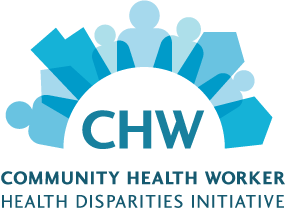Start a Program
CHW Initiative Tip
Find information, tools, and tips for starting, running, and sustaining a successful community health worker heart health program in the Start to Finish Toolkit. Learn the many ways you can use our heart health materials for your community, no matter the size of your program.

The Community Health Worker Health Disparities Initiative provides a culturally relevant community health worker (CHW) program and materials to help you start or expand a program to reduce heart disease health disparities in your community.
Start to Finish: Your Toolkit to Plan and Run a Heart Health Program
This online, hands-on, information-packed toolkit was developed for organizations interested in running community health worker (CHW)-led heart health programs in their communities. It connects you to the NHLBI’s heart health materials and instructs you how to plan, run, and evaluate a heart health CHW program from start to finish.
There are three implementation strategies, depending on your community’s needs:
- Train-the-Trainer. This strategy is geared toward organizations that are interested in using CHW manuals to train CHWs about healthy living, heart disease risk factors, and strategies for maintaining a healthy heart. The CHWs who participate are then able to train other CHWs in their communities about the same topics, sharing heart health knowledge and strategies.
- Community Education. Trained CHWs can conduct community education sessions using one of two approaches:
- Teach sessions of the manual to community members. Under this approach, CHWs teach all or selected sessions of the manual at a variety of community sites. Participants complete a questionnaire called “My Health Habits” before and after the educational session. This evaluation tool collects information on participants’ knowledge of heart disease risk factors, attitudes toward lifestyle changes, and their plans for changing health and lifestyle behaviors.
- Teach sessions of the manual and screen community members. In this approach, sessions of the manual are taught together with screening for heart disease risk factors. Screening can include taking participants’ height, weight, and waist measurements. Blood pressure, blood cholesterol, and blood glucose screenings can also be conducted with the help of a primary care clinic or health professional. After being screened, community members with elevated clinical measures should be referred to a health clinic for follow-up.
- Management of Lifestyle and Clinical Measures. This strategy is used in a clinical setting where CHWs are part of a clinical health care team. During normal clinic visits, patients are asked whether they would like to participate in the educational sessions. If they do, then a trained CHW will:
- Teach the sessions of the manual or share specific heart health messages with patients.
- Monitor patients’ clinical measures (blood pressure, blood cholesterol, body mass index, waist measurement, weight, and blood glucose level).
- Follow up with patients to offer support and encouragement as they use their increased heart health knowledge to make health and lifestyle changes.
- Help patients with medication adherence.
No matter which strategy you use, the CHW programs are:
- Driven by community health workers. CHWs are deeply rooted in their own communities, uniquely positioning them to share information and knowledge, promote behavior change, and link people to care in ways that respect and embrace the local community’s culture and strengths.
- Easy to use and flexible. Program materials are designed to be adaptable for your needs. Materials can be used to:
- Train CHWs to deliver heart health education and organize community activities.
- Give a talk about blood pressure, cholesterol, or other heart health topic in community settings.
- Add CHW-led education and patient support to a clinical team.
- Present a healthy-cooking demonstration at health fairs.
- Organize a walking club.
- Science-based and field-tested. The NHLBI’s research on controlling risk factors for heart disease informs CHW programs and health education materials.
- Effective. In addition to having high reported levels of CHW and participant satisfaction, the NHLBI’s programs help increase knowledge and promote heart health behavior change.
You may choose to present an entire 12-session heart health education program or select sessions or materials that your community needs the most. Each session includes activities designed to:
- Engage community members.
- Build on knowledge that community members already have.
- Enable community members to practice what they learn.
- Encourage community members to share information and activities with their family and friends.
Whether you are part of a health clinic, faith-based organization, community group, or other organization interested in CHW-led heart health education, the NHLBI can provide you with educational materials to start or expand a heart health program. With the NHLBI’s materials and program implementation and evaluation tools, you can start a program that can help improve the health and well-being of people and families in your community.
Last Updated: June 2014







